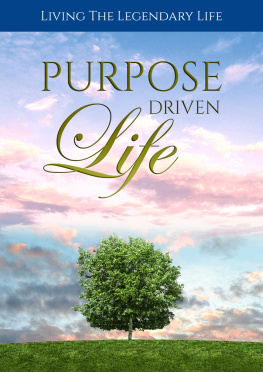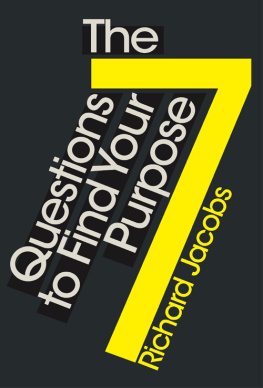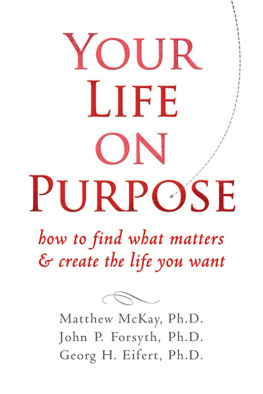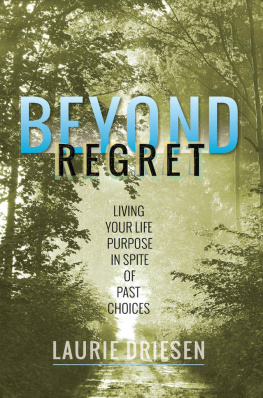I felt that what I was standing on had given way, that I had no foundation to stand on, that that which I lived by no longer existed, and that I had nothing to live by.
LEO TOLSTOY
JUNE 20, 2010, 5:15 A.M. IN MY KAYAK, A FEW MILES FROM SHORE, paddling hard... Lake Michigan, smooth and ice-cold, my kayak cutting through a thick, silky curtain of water off the bow. Still in boxers and T-shirt, hadnt thought about dressing for the chilly morning air... wasnt really thinking.
Id been woken by a dream, climbed out of bed, and a minute later pushed off into the lake. Not very smartLake Michigan owns hundreds of ships and certainly its share of puny kayaks... didnt really care.
Maybe Ill paddle to Wisconsin, I thought, but the sun stopped my paddling as it broke over the horizon. I turned toward the east and sat still... perfectly quiet.
Suddenly, a billion gold flecks of light surrounded me as the sun rose. In that moment, I felt the warmth and love of my daughter Julia.
Get over it, Dad, she was telling me. I almost tipped over. It was startling to hear her voice. Shed died just a few months before.
The crossroad of my life was right theretwo miles off the shore of Lake Michigan. The signs were clear. One arrow said, Change Everything. The other said, Death. And Julia wasnt derisively telling me to Get over it! She was telling me that if I was to survive, I would need to get over myself and live for what matters most.
When I came back to shore, I realized it was Fathers Day. This was her gift to methe gift that would save my life.
Nineteen years earlier, Julia was born completely healthy. Then, when she was about six months old, she contracted the chicken pox virus. Rather than causing a few days of fever and rash, however, this virus attacked and destroyed her heart. No one knows why, but luckily, it happens to only a very small number of people. Unluckily, one of them was my daughter.
Her only hope, and it was a long shot, was a new heart; without it, shed last only a few months. In 1990, very few children had received heart transplants, and there was almost no data on what would happen to them. Given this uncertainty, one of the biggest decisions we needed to make was whether to even put her on a transplant waiting list. The alternative was letting her die in peace.
As hard as it was even to think about this option, it was a very real consideration. We had no idea what would happen if she were to receive a new heart. No idea what the quality of her life would be. We were on the front edge of this wave of ice-cold water and would be for her entire life.
The discussions with familymy wife, Jeri, and older daughter, Rachaelwere hardly idle dinner-table chatter. The topics were, What is a good life? and What is a life worth living? What if Julia died when she was three? How about nine? What about the quality of those years? Would we be happy with the decision we were making?
We decided to list her for a transplant. In part, frankly, we couldnt bear to let her die. But we were well aware that, if she did get a new heart, wed need to work incredibly hard to keep her wellto give her a big life. Wed also need to approach life with her in a whole new wayin a way that assumed she might die at any moment.
When we talked about a big life, we werent referring to a Make-A-Wish life. Make-A-Wish is a nonprofit organization that provides extraordinary experiences for very sick and dying children. Its a wonderful group with a powerful missionbut we couldnt spend every day of Julias life in Disney World. What we were determined to do was to provide her with a life of discovery, of meaningful relationships that extended beyond her family, and of love.
Julia received a new heart on Valentines Day, 1992, and our lives were changed forever. She lived through many challenges and her life wasnt easy by any stretch, but it was a big life: friends, camp, softball, Girl Scouts, travelexperiences that many kids have but that Julia never took for granted.
This expression took for granted suggests that youre owed something, that you naturally deserve something. In this case, that life and its experiences should be granted to you. The unexpected thing that happened to the rest of our family is that we stopped taking our own lives for granted. We stopped expecting a certain life to happen to us and instead started creating our own lives. When this happened, our lives turned from black and white into Technicolor.
Personally, I started caring less about what people thought of me and more about what I thought of myself. As an assistant professor at a university, I started caring less about getting tenure and more about making a difference in the world. Most importantly, I stopped thinking that Id live forever and started thinking that Im on this earth for an extraordinarily brief period of timeso I should make the most of it.
Julia wanted to emulate the people who helped her so much through the years, so she enrolled as a student in the University of Michigans School of Nursing. On spring break, 2010, we took our two daughters and their boyfriends to an island in the Caribbean. The third night of our stay, after having a dinner by the ocean, Julia turned to her boyfriend and said, Im so happy right now that I could die. And that night she did. She died, in her sleep, of a sudden heart attack.
The dreadful event that had been in the back of my mind for nineteen years had happened. Having considered this eventuality hundreds of times, I tried to gird myself. My goal would be to return to a normal, productive life. The question was just how long it would take: A week? A month? Six months?
A month later I was giving a talk to three hundred people on the topic of health and wellnessthe subject of my profession. The audience knew nothing about my recent loss. The speaker before me was an occupational health physician who studied the impact of stressful events on workplace productivity. He said something like, If you lose a parent, your productivity drops by an average of so-and-so percent, which returns in an average of such-and-such time. If you lose a spouse, your productivity drops by.... Then he paused, took a breath, and said, But if you lose a child, your productivity never returns.
He had no idea that I had just lost a child, but I still had a strong urge to tell him where he could shove his statistics. I didnt, but his words came back to me a few months later when I was sitting in my kayak, watching the sunrise. Would life ever be Technicolor again? Would I ever be productive again? Would I ever feel energetic again? Would I ever feel in control again? Was there something I could do to get these things back?
Those who lose their foundation to stand on often turn to Viktor Frankl, the Austrian psychiatrist. Frankl was one of the firstand certainly the foremostto scientifically analyze the existential philosophy of purpose and meaning that can emerge from tragedy. In doing so, he created a new approach to psychotherapy.
Frankl observed through his personal experiences during three years as a prisoner in Nazi concentration camps that individuals who were able to maintain a purpose in their lives were more likely to survive: Woe to him who saw no sense in his life, no aim, no purpose, and therefore, no point in carrying on. He was soon lost.
The need to have a purpose in life is not only relevant to those whove suffered tragedyits relevant to everyone. And while Frankls words have helped millions of people surviveand even grow fromthe chaotic storms of life, many more millions have learned to simply live more purposeful lives. His famous work,







